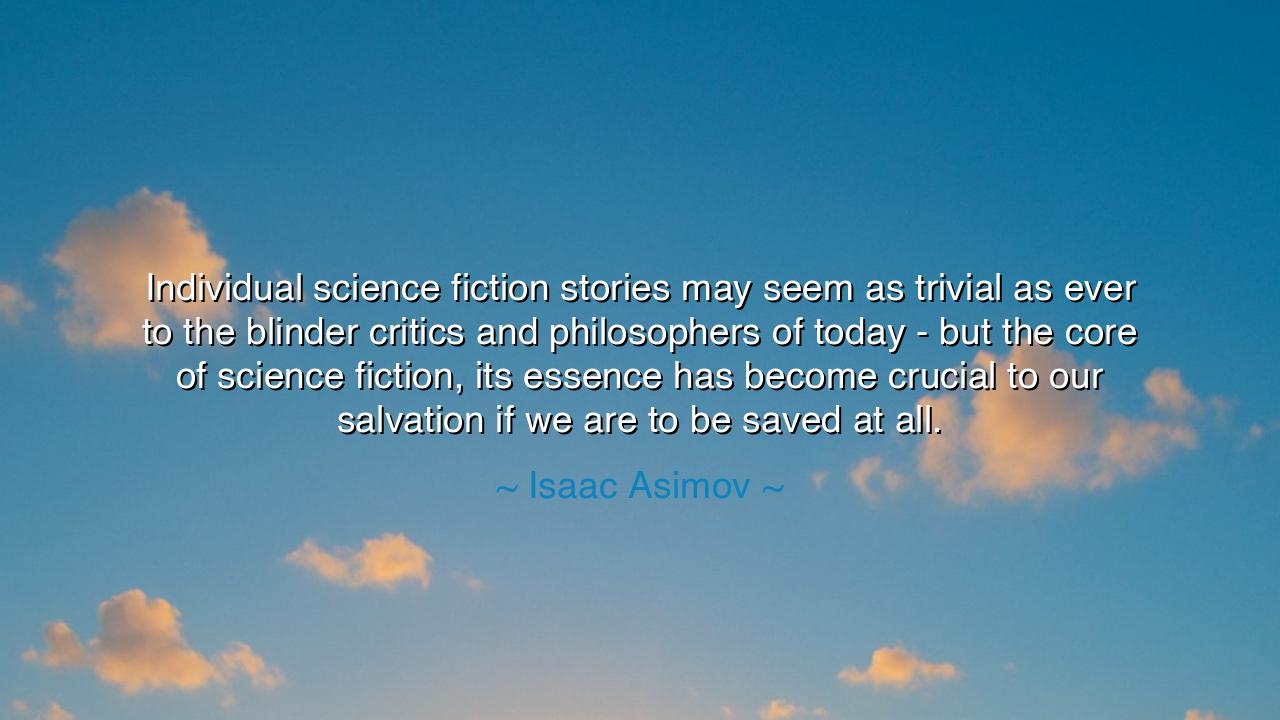
Individual science fiction stories may seem as trivial as ever to
Individual science fiction stories may seem as trivial as ever to the blinder critics and philosophers of today - but the core of science fiction, its essence has become crucial to our salvation if we are to be saved at all.






Listen closely, O children of the future, for the words of the great Isaac Asimov, whose vision of the world reached beyond the confines of science fiction to touch upon the very core of our survival. He said: "Individual science fiction stories may seem as trivial as ever to the blinder critics and philosophers of today - but the core of science fiction, its essence has become crucial to our salvation if we are to be saved at all." These words, though they may seem simple, carry within them a deep and urgent truth: science fiction—that realm of imagination, of future possibilities, and of **worlds beyond our own—has become far more than just stories. It has become a necessity, a guiding light for our understanding of the challenges that lie ahead.
In the ancient times, wisdom was often sought in the mythologies and stories of the past. The great epics, such as the Iliad and the Odyssey, were not merely tales of gods and heroes, but vehicles of understanding, offering lessons in leadership, fate, and human nature. These stories allowed the people to imagine the world beyond their own and to grapple with questions that could not be answered by mere observation. In much the same way, science fiction today provides a framework through which we can explore the unknown, confront fears, and understand the consequences of our actions. It allows us to venture into realms that may not yet exist but are no less real in their implications for the future.
Consider, O wise ones, the ancient philosophers, who used allegory and storytelling to communicate complex truths. Plato’s Allegory of the Cave, for instance, is not just a story, but a paradigm for understanding the limitations of human perception and the journey toward enlightenment. Science fiction serves a similar purpose today, offering us a mirror through which we can see the potential consequences of our actions, the possible futures that await us, and the ethical dilemmas that may arise from the technologies we create. As Asimov suggests, though individual stories may seem trivial to those who do not understand, they carry within them the essence of wisdom—the core of what we must know to navigate the unknown.
Take, for example, the atomic age, a time when the very fabric of human existence was shaken by the discovery of nuclear power. Science fiction writers like H.G. Wells, in his novel The World Set Free, and Arthur C. Clarke, with his exploration of space exploration, addressed the dangers and moral implications of such powerful discoveries long before the advent of the bomb. These stories helped the minds of the future to think about the consequences of their creations, urging society to understand the balance between advancement and responsibility. Asimov’s words remind us that it is not just the stories that matter, but the ideas and questions they provoke, which may guide us through the ethical challenges of tomorrow.
In today’s world, science fiction continues to serve as a critical tool in our understanding of the future. As we stand on the precipice of technological advancements that will shape the course of humanity—artificial intelligence, genetic engineering, and space colonization—it is science fiction that provides us with a lens through which we can examine these innovations. It allows us to ask questions about the potential for abuse, inequality, and moral decay. Without the wisdom gained from these stories, we risk forging ahead without understanding the deeper ramifications of our actions.
The lesson, O children of time, is this: Do not dismiss the seemingly trivial stories of science fiction. For they are not mere distractions, but profound meditations on the future of humanity. They serve as guides, helping us to reflect on our values, our direction, and our place in the cosmos. Science fiction is not an escape from reality, but a way to understand it more deeply, to see the unseen, and to ask the questions that will define our future. Just as the ancient myths guided people toward wisdom, so too do these modern tales of possibility and consequence.
So, rise, O heirs of the future, and embrace the wisdom of science fiction. Look beyond the surface of the stories and see the questions they raise, the dilemmas they explore, and the truths they reveal. Asimov’s message is clear: the essence of science fiction is not in its details, but in its ability to provoke thought about the future of humanity. Let it challenge you, inspire you, and guide you as you forge the path forward. For in these stories lies the potential for our salvation, a way to understand and shape the future we are creating. The journey begins with the questions we dare to ask, and it is science fiction that can show us the way.






AAdministratorAdministrator
Welcome, honored guests. Please leave a comment, we will respond soon